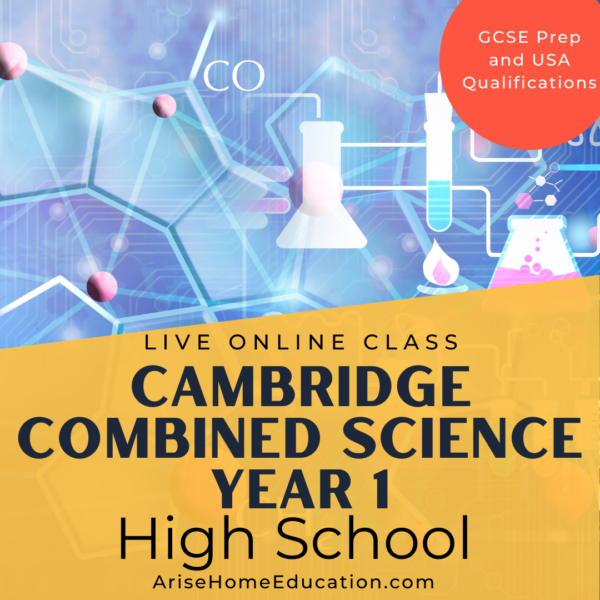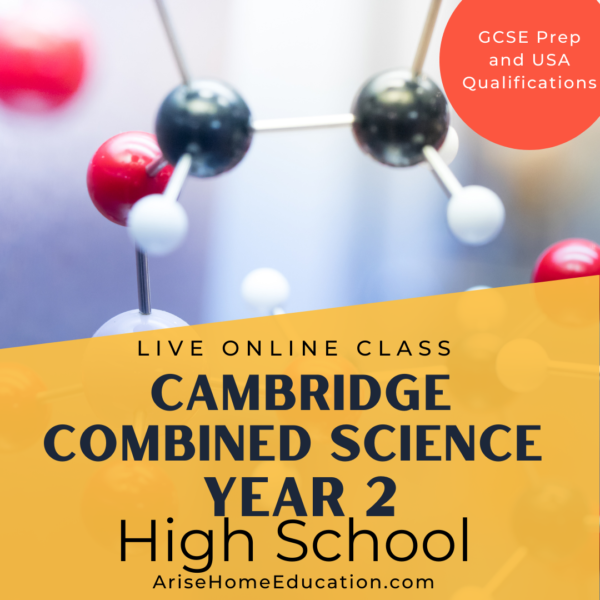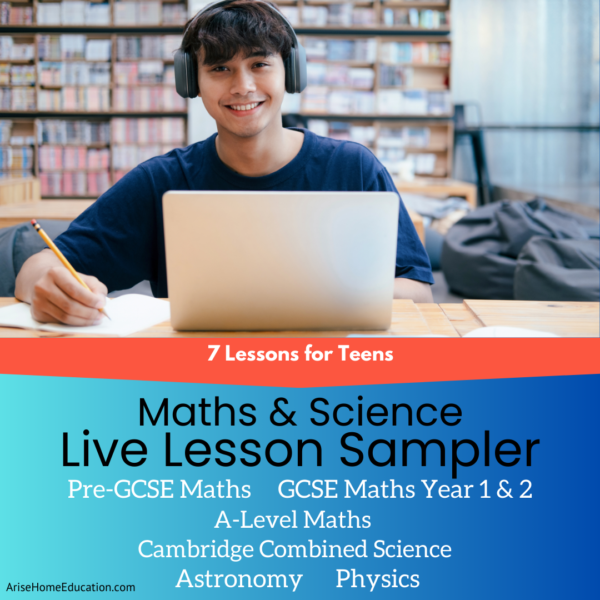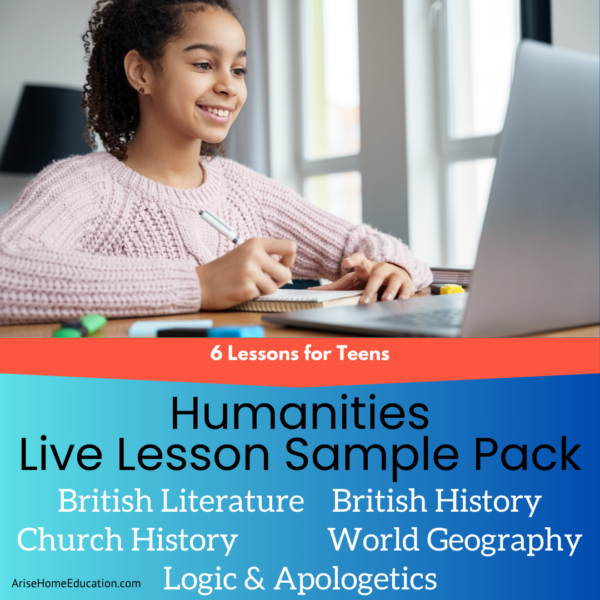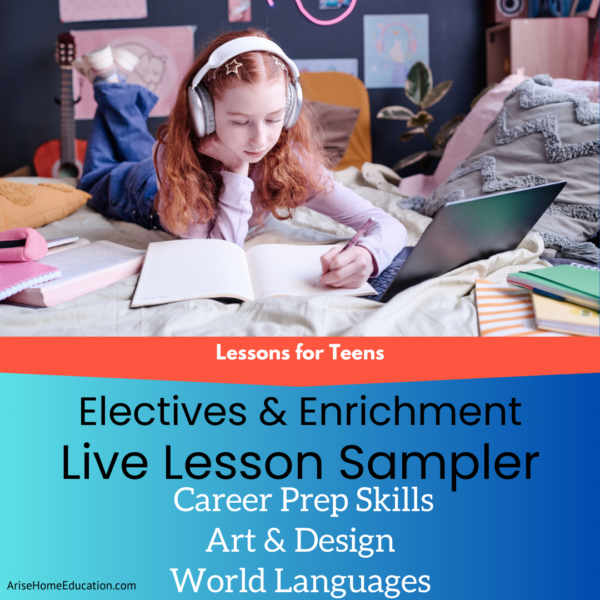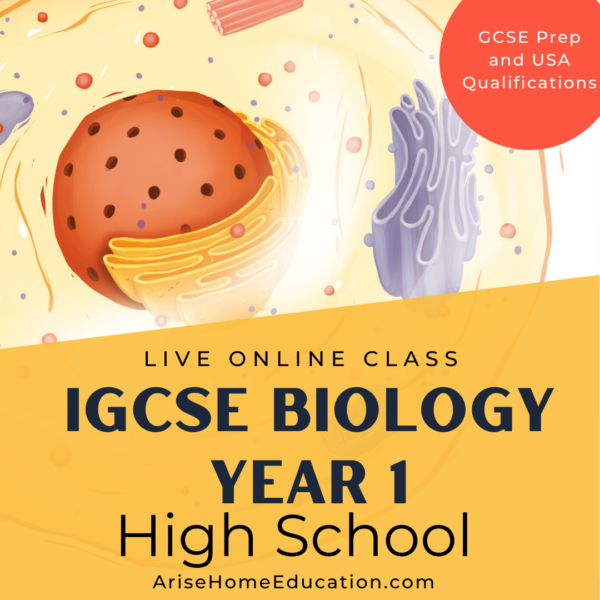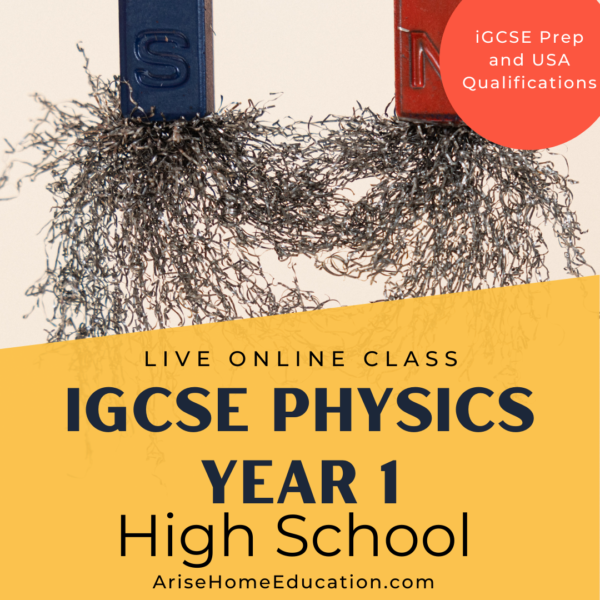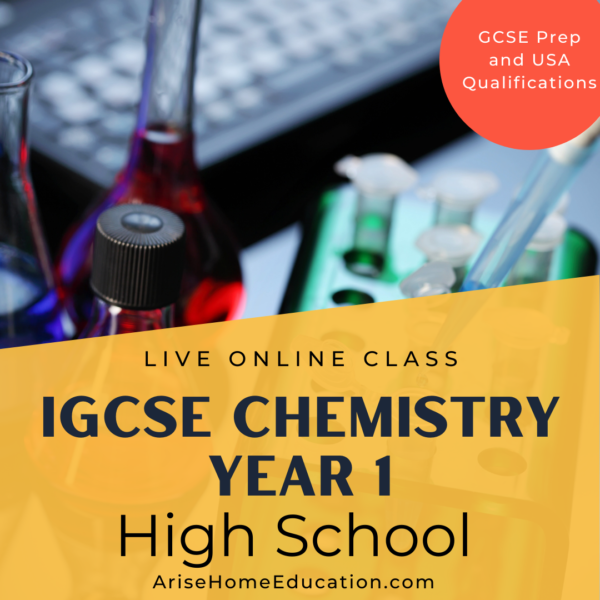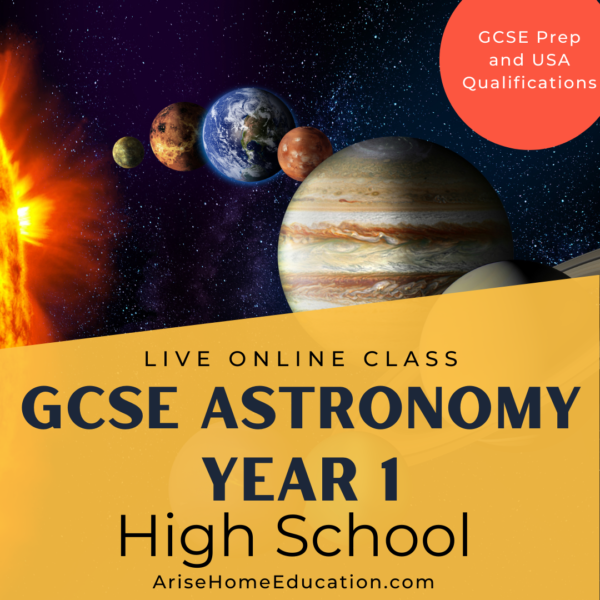Understanding the Cambridge International GCSE Combined Science (iGCSE) Curriculum
At Arise Home Education, we are committed to providing high-quality Christian home education through live online classes. One of the core courses we offer is the Cambridge International GCSE (iGCSE) Combined Science curriculum. It is a balanced and engaging programme that covers essential topics in Biology, Chemistry, and Physics from a Christian worldview perspective.
This article was written by Hannah Smith. She will be tutoring for A Level Maths, Combined Sciences, Physics, Astronomy, Chemistry, Biology, and Pre-iGCSE Maths. She is passionate about using her God-given skills in Christian home education online.
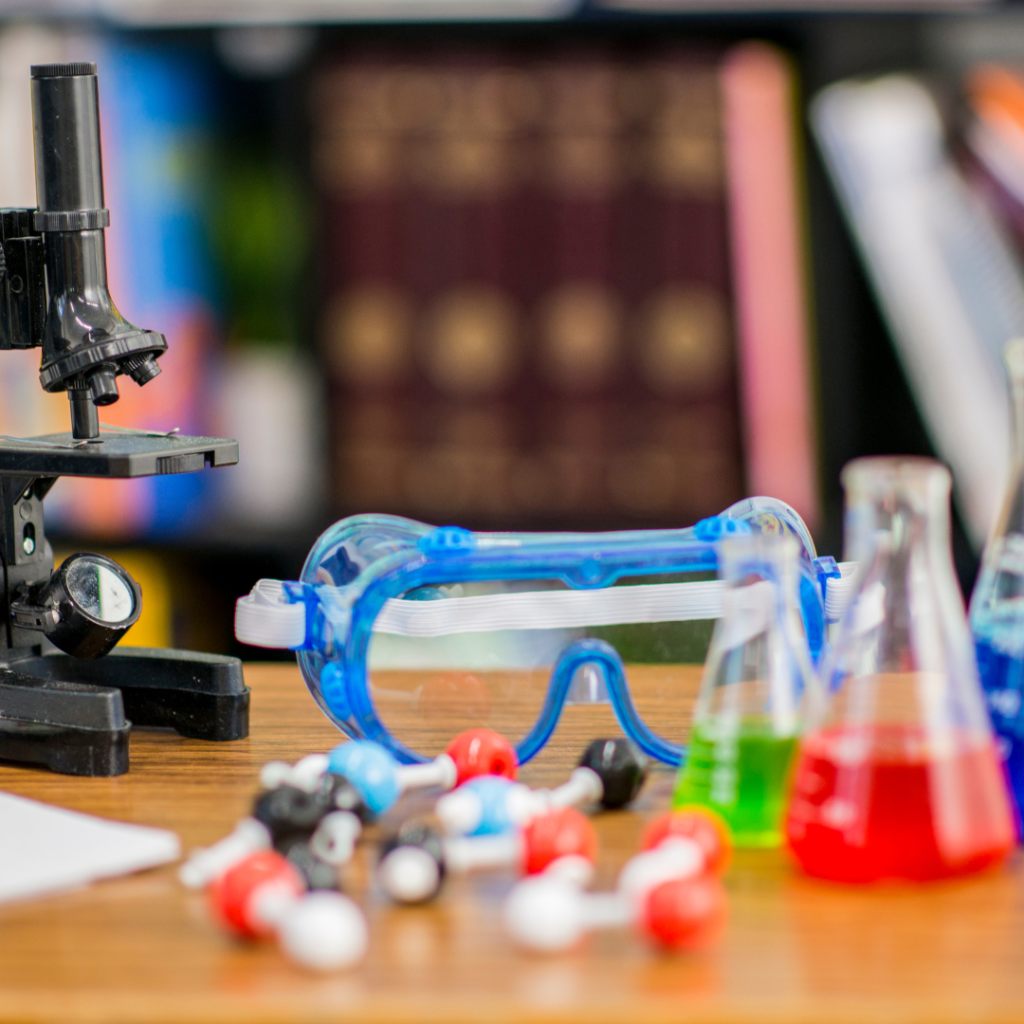
Cambridge provides both IGCSE and GCSE qualifications in Combined Science, each with its own set of awards and difficulty level. The IGCSE Combined Science, often referred to as a single award, gives you one IGCSE, while the Co-ordinated Science, or double award, grants two IGCSEs. Both qualifications include topics in Biology, Chemistry, and Physics, but the Co-ordinated Science offers a more comprehensive curriculum.
At Arise Home Education, we offer the single award iGCSE Combined Science course.
Major Scientific Concepts
In the Cambridge iGCSE Combined Science course, students explore fundamental scientific concepts. Cell biology is one such key area. It involves understanding the structure and function of cells, the basic units of life. This knowledge helps students grasp how living organisms operate and adapt.
Another core topic is chemical reactions, where students learn about how substances interact and transform. This is crucial for understanding processes in everyday life, from cooking to industrial manufacturing. Equally important are plant structures, which students explore to understand how plants function and contribute to ecosystems. These topics are part of the science education curriculum designed to cater to students of all abilities.
The Periodic Table and Scientific Ideas
The periodic table is a vital tool in science lessons, offering insights into the properties of different elements. By understanding the periodic table, students can predict how elements will behave in chemical reactions. This knowledge is foundational for science subjects and enhances students’ practical skills.
Throughout the course, students engage with scientific ideas, developing a strong scientific vocabulary and the ability to communicate complex concepts clearly. The use of mathematics is also emphasized, as mathematical skills are essential for analyzing scientific data. Online resources, including past papers and practical work assignments, support the student’s progress and reinforce learning outcomes.
-
Cambridge Combined Science Year 1
£340.00 -
Cambridge Combined Science Year 2
£340.00
How We Structure the Course
The Cambridge IGCSE Combined Science syllabus is designed to give students a well-rounded understanding of the three sciences, making it an excellent choice for those who want a broad scientific foundation. At Arise Home Education, we split the course over two years, ensuring a manageable workload while allowing students to develop their understanding progressively. We dedicate roughly equal time to Biology, Chemistry, and Physics each year.
Year 1 Overview
In the first year, students build a strong foundation in the three sciences, covering key concepts that will be expanded upon in Year 2.
Biology:
- The fundamental traits that define living things such as movement, respiration, sensitivity, growth, reproduction, excretion, and nutrition.
- The structure and function of cells, as well as the key biological molecules like carbohydrates, proteins, and lipids that sustain life.
- The processes of diffusion, osmosis, and active transport that regulate the movement of substances within organisms.
- The role of enzymes in biological reactions
- How plants obtain nutrients for growth through processes like photosynthesis.
- The human diet, essential nutrients, and the digestive system’s role in breaking down food and absorbing nutrients.
Chemistry:
- The different states of matter (solid, liquid, gas) and how particle theory explains changes of state. Includes atomic structure and the properties of subatomic particles.
- The differences between elements, compounds, and mixtures, including how they are formed and separated.
- The types of chemical bonds (ionic, covalent, and metallic), their properties, and how they affect the behaviour of substances.
- The properties of acids and bases, the pH scale, and how neutralisation reactions are used to produce salts.
- The organisation of elements in the periodic table, trends in reactivity, and the significance of groups and periods.
Physics:
- The fundamental quantities in physics, including length, time, and mass, and concepts like speed, velocity, and acceleration.
- The different types of forces, Newton’s laws of motion, and the relationship between work, energy, and power.
- The concepts of heat transfer, temperature, and the behaviour of gases, including conduction, convection, and radiation.
- The properties of waves, differences between transverse and longitudinal waves, and applications of light and sound waves.
- The principles of electric circuits, including current, voltage, resistance, and how electricity is used in everyday life.
Year 2 Overview
Building on the knowledge gained in Year 1, Year 2 covers more complex concepts and their applications in real-world contexts.
Biology:
- The process of cellular respiration, how gases are exchanged in plants and animals, and the importance of oxygen and carbon dioxide.
- How substances like water, nutrients, and gases are transported through vascular systems in plants and the circulatory system in animals.
- How organisms detect and respond to stimuli using nervous and hormonal systems.
- The mechanisms of sexual and asexual reproduction, genetic inheritance, and variation within species.
- The interactions between organisms and their environment, food chains, and the effects of human activity on ecosystems.
Chemistry:
- How metals are ranked by reactivity and the different methods used to extract them from ores.
- The process of breaking down compounds using electricity, including applications like electroplating and aluminium extraction.
- The concepts of exothermic and endothermic reactions, including how energy is absorbed or released in chemical changes.
- The factors affecting reaction rates, such as temperature, concentration, surface area, and catalysts.
- The study of carbon-based compounds, including hydrocarbons, alcohols, and polymers.
Physics:
- The properties of magnets, magnetic fields, and how electromagnetism is used in electric motors and generators.
- The nature of radioactive decay, types of radiation, half-life, and applications in medicine and industry.
- Advanced topics in electricity, including alternating and direct current, transformers, and electrical power.
- A deeper look at Newton’s laws, momentum, and the effects of forces on motion in real-world scenarios.
- The study of celestial objects, the solar system, and fundamental concepts such as gravity and orbits.
Completing the Cambridge Combined Science Curriculum
By the end of year 2, students will have completed the subject content and will be ready to revise and prepare for formal assessment. Parents are responsible for finding and securing an exam centre for their student to sit the exam. For students following the US qualifications model, this two-year course fulfills two years of high school science.
-
Home Ed Success in The UK: USA Qualifications & UK Exam Model
£30.00 -
The Complete Self-Paced Course: USA Diploma and Transcript Model for HE Success in The UK
Original price was: £97.00.£49.00Current price is: £49.00.
Our Christian Approach
At Arise Home Education, we integrate a Christian perspective throughout our teaching, encouraging students to see science as a means of exploring and understanding God’s creation. We uphold biblical principles while ensuring students receive a rigorous and thorough science education.
Who Is The Combined Science Curriculum and Course For?
The Cambridge Combined Science curriculum and course is ideal for students who:
- Are home-educated and seeking structured, high-quality science instruction
- Prefer a Christian learning environment
- Want to develop a strong foundation in Biology, Chemistry, and Physics
- Need a science qualification but are not particularly interested in a specific science, or cannot decide which to choose.
- Require a solid science background for general education, further studies, or future career opportunities.
Practical Skills and Assessments
Emphasizing Practical Skills
Practical work is at the heart of science education, especially in the Cambridge iGCSE Combined Science curriculum. Students engage in hands-on experiments, which help them understand key concepts and scientific ideas better. Through practical skills, students of all abilities can grasp complex scientific vocabulary and apply theoretical knowledge in real-world scenarios. This approach aligns with the national curriculum’s standards, ensuring a high standard of science education.
Developing practical skills fosters a deeper understanding of subjects like cell biology and chemical reactions. It allows students to explore the periodic table and plant structures firsthand, driving home the importance of science subjects. By the end of the course, students are expected to demonstrate a solid grasp of scientific ideas through these experiments. This practical focus ensures the majority of students can succeed and comprehend the combined science course intricately.
Preparing for Practical Assessments
Resources are abundant for students aiming to hone their practical skills. Online resources and past papers are invaluable tools for practice. These materials, including Google Classrooms, provide simulations of practical work, allowing students to refine their skills. They offer insights into the types of assessments students might encounter and help track a student’s progress effectively.
Additionally, integrating maths skills into science lessons is crucial. The use of mathematics and mathematical skills is indispensable in executing and understanding practical work. Resources emphasize these aspects, reinforcing the importance of maths skills in science education. Preparing for assessments through these methods ensures that students meet high standards and excel in their practical evaluations.
Are Arise Live Classes A Good Fit For Your Teen?
Grab a live lesson bundle and learn about the course, the tutor, and the weekly homework load.
Join Us at Arise Home Education
Our live online classes allow students to engage in real-time discussions, ask questions, and participate in interactive lessons. If you’re interested in enrolling your child in our IGCSE Combined Science course, we’d love to support them on their learning journey!
Live, Onlne Science Classes at Arise
-
Cambridge Combined Science Year 1
£340.00 -
Cambridge Combined Science Year 2
£340.00 -
iGCSE Biology Year 1
£340.00 -
iGCSE Physics Year 1
£340.00 -
iGCSE Chemistry Year 1
£340.00 -
High School GCSE Astronomy: Year 1
£340.00
FAQ
What is the Cambridge iGCSE Combined Science Curriculum?
The Cambridge iGCSE Combined Science Curriculum is a comprehensive program designed for students of all abilities, offering a balanced blend of key concepts in biology, chemistry, and physics, emphasizing practical skills and scientific understanding.
What topics are covered in the curriculum?
The curriculum covers essential topics including cell biology, chemical reactions, plant structures, and the periodic table, ensuring a solid foundation in science.
How does the curriculum support students of all abilities?
The curriculum is designed to be accessible and flexible, allowing students to progress at their own pace with the support of online resources and past papers.
What resources are available for practical assessments?
Students have access to a variety of online resources, including simulations of practical work, past papers, and Google Classrooms, which help refine practical skills and prepare for assessments.
How is mathematics integrated into the curriculum?
Mathematics is emphasized throughout the course, helping students develop mathematical skills alongside their scientific understanding, which is essential for analyzing data and executing practical work.
What strategies do educators use to support diverse learning needs?
Educators adapt the national curriculum to suit individual learning styles, incorporate practical work, and utilize past papers and online resources to identify areas for improvement.
How do digital platforms enhance learning in the curriculum?
Digital platforms like Google Classrooms provide easy access to materials, interactive content, and timely feedback, complementing traditional teaching methods and making learning more dynamic.
What recommended online resources can students use?
Students can benefit from websites like BBC Bitesize and Khan Academy, which offer interactive lessons on key concepts and align with the national curriculum.
Why are past papers important for exam preparation?
Past papers help students familiarize themselves with exam formats, highlight recurring topics, and boost confidence by identifying areas that require more focus.
What is the significance of achieving high standards in science education?
High standards are crucial for ensuring a comprehensive grasp of scientific vocabulary and the development of practical skills necessary for conducting experiments and understanding scientific ideas.
How does the combined science course prepare students for future studies and careers?
The course provides a solid foundation for advanced scientific inquiry, encouraging students to pursue further studies in STEM fields and opening doors to diverse career opportunities.
More Science Resources for Homeschoolers
From Captivating Compass
3 Ways Good Science Lab Sheets Teach Life Skills
From Arise

